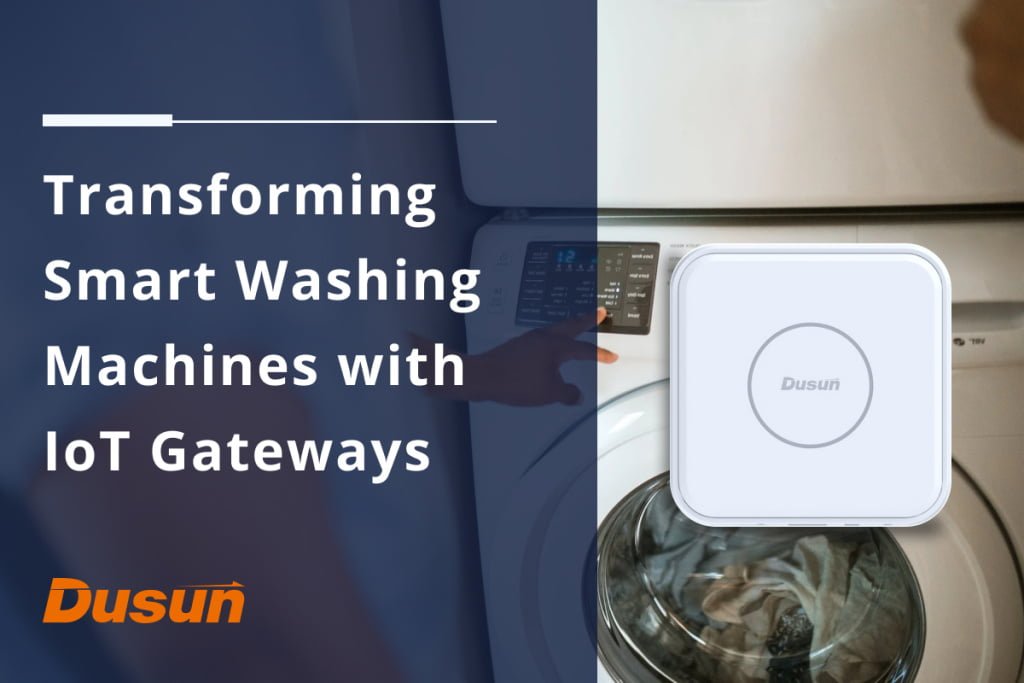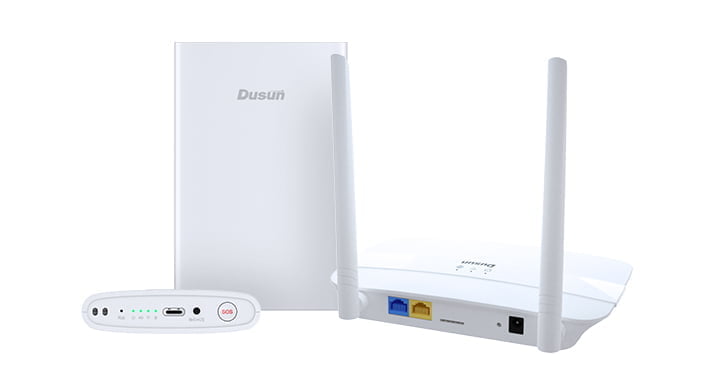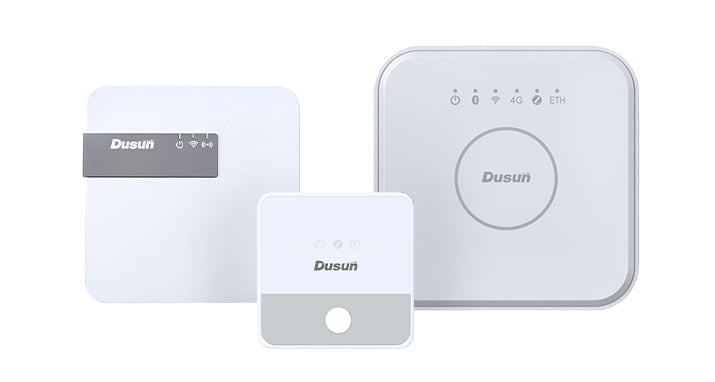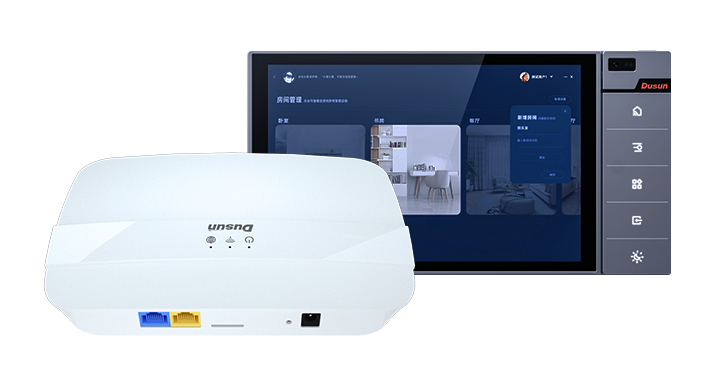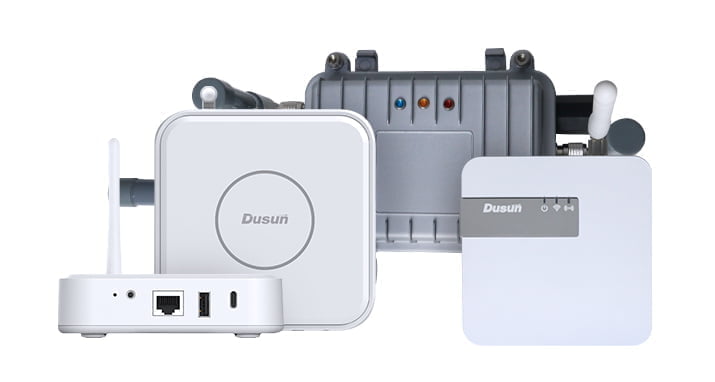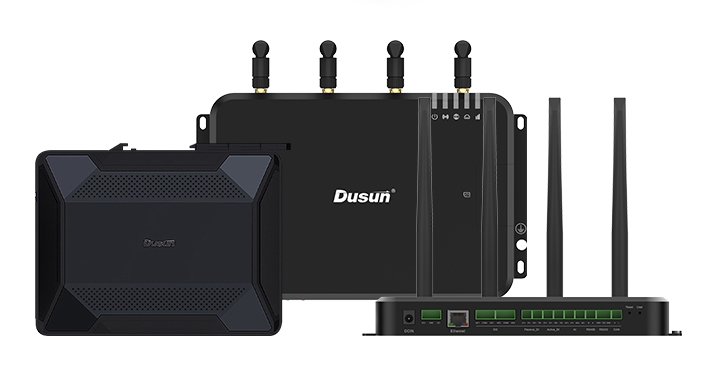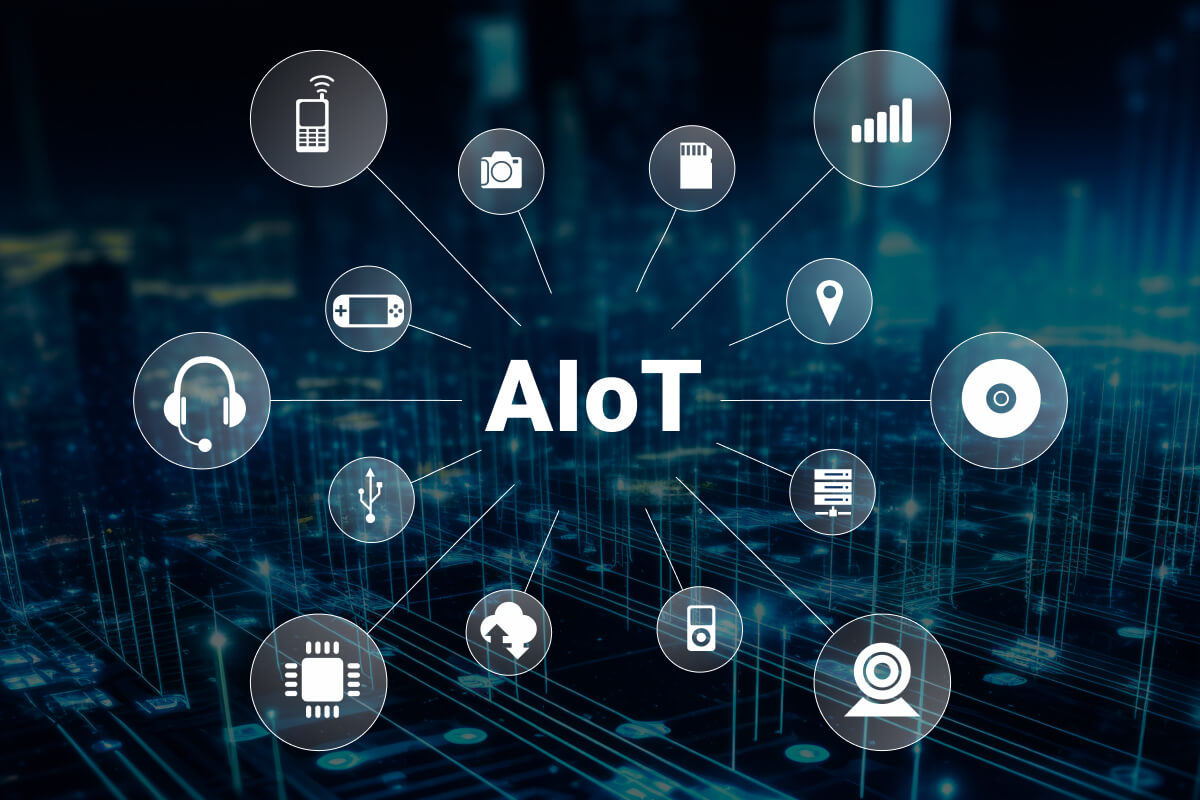Smart washing machine combines advanced IoT gateways, intelligent features, and seamless connectivity to provide a laundry experience like never before. Smart washing machines offer time-saving features, improved cleaning performance, energy and water savings, and enhanced convenience through remote control and monitoring.
Its smart sensors and devices enable customized wash cycles, automated adjustments, self-diagnosis and maintenance reminders, and integration with smart home systems.
This article delves into smart washing machines, exploring their functionality, benefits, and incredible convenience. This article explores the integration of IoT in washing machines, highlights the benefits for equipment manufacturers, and presents Dusun IoT’s high-performance IoT gateway, the DSGW-210, as a suitable solution for seamless integration.
What Is a Smart Washing Machine?
A smart washing machine is an advanced appliance that combines traditional washing capabilities with an IoT gateway, transforming it into a connected device. Smart washing machines offer enhanced functionalities, convenience, and efficiency by integrating sensors, connectivity options, and advanced data analysis.
IoT Integration in Smart Washing Machine
The IoT gateway is a critical component in IoT-enabled washing machines, enabling connectivity, data processing, interoperability, security, and offline functionality.
It is pivotal in creating a smart and interconnected ecosystem, allowing users to control and monitor their washing machines remotely, optimize energy usage, and enhance overall washing performance. Here are some key aspects of IoT integration in washing machines:
Sensors and Connectivity Options
Smart washing machines have load, temperature, and water level sensors. These smart sensors collect valuable data about the laundry process and transmit it to the IoT gateway. Its vast connectivity choices enable the washing machine to connect to the internet and communicate with other devices in the smart home ecosystem.
Continuous Improvement and Innovation
The data collected through the IoT gateway provides equipment manufacturers with valuable insights for constant improvement and innovation. By analyzing usage data, manufacturers can identify areas for optimization, address customer pain points, and develop new features or functionalities.
This iterative approach to product development ensures that manufacturers stay at the forefront of technological advancements and meet customers’ changing needs.
Remote Control and Monitoring Features
Through the integration of an IoT gateway, smart washing machines offer remote control and monitoring capabilities. Users can conveniently manage their laundry tasks using smartphones or other connected devices.
They can start or pause wash cycles, adjust settings, and receive real-time updates on the progress of their laundry. The IoT gateway ensures seamless communication between the user and the washing machine, enhancing convenience and flexibility.
Local processing and decision-making
The IoT gateway can perform local data processing and decision-making within the washing machine. It allows for real-time response and automation without relying on constant cloud connectivity.
Offline functionality
The IoT gateway enables the washing machine to operate offline when internet connectivity is intermittent or unavailable. Once the connection is reestablished, it synchronizes the locally stored data with the cloud or other devices. It ensures uninterrupted functionality and prevents data loss.
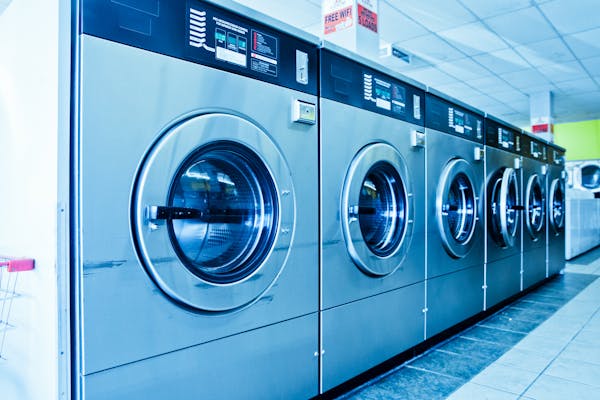
How does a smart washing machine work?
Commercial washing machine providers are adopting the IoT to expand their business. By utilizing machine-generated data, they offer value-added services such as real-time monitoring, remote troubleshooting, and predictive maintenance.
These services differentiate them from competitors and create recurring revenue streams, ensuring business stability and efficient operations. Some of the key features of industrial smart washing machines are discussed below.
Remote Control
With the IoT gateway as the central control hub, users can remotely manage their smart washing machines using dedicated mobile applications. The gateway establishes a secure connection between the appliance and the user’s smartphone, enabling them to control the washing machine’s functions from anywhere.
Energy Efficiency and Optimization
The IoT gateway enables the washing machine to adjust wash cycles based on load size, fabric type, and user preferences by leveraging data analysis. This optimization leads to energy savings, reduced environmental impact, and lower user utility bills.
Automatic Detergent Dispensing
The IoT gateway’s integration enables precise control over detergent dispensing based on load size and fabric type, enhancing the washing machine’s efficiency and convenience. This automated process ensures optimal cleaning results while minimizing detergent wastage.
Smart Cycles and Customization
The mobile app, connected to a smart washing machine through an IoT gateway, lets you choose the appropriate cycle, adjust parameters such as water temperature, spin speed, and detergent dosage, and even create custom cycles based on your preferences.
Troubleshooting and Maintenance
Smart washing machines can diagnose certain issues or malfunctions and notify you through the mobile app. They may display error codes or provide troubleshooting suggestions, allowing you to address minor problems yourself or seek assistance from customer support.
Smart Home Integration
Popular home automation platforms such as Amazon Alexa, Google Assistant, or Apple HomeKit are also compatible with smart washing machines. This integration enables you to control your washing machine using voice commands and integrate it into automated routines with other smart devices in your home.
With the help of a compatible IoT gateway like Dusun DSGW-210 IoT gateway controller , you can seamlessly connect your smart washing machine to any of these smart home platforms.
Benefits of smart washing machines
By embracing smart technology in their washing machines, manufacturing companies can stay ahead of the competition, improve customer satisfaction, gather valuable data, and explore new revenue streams. Here are some key advantages for manufacturers.
Market Differentiation
Smart washing machines offer advanced features, personalized experiences, and seamless connectivity, setting them apart from traditional washing machines. Manufacturers can leverage this differentiation to attract customers and gain a competitive edge.
Enhanced Customer Satisfaction
Smart washing machines equipped with IoT capabilities enhance users’ convenience and efficiency. The ability to remotely control and monitor the washing machine, optimize energy consumption, and receive personalized recommendations leads to higher customer satisfaction.
Data-driven Product Development
IoT integration in washing machines generates valuable data regarding usage patterns, energy consumption, and user preferences. Equipment manufacturers can leverage this data to gain insights into customer behavior and make data-driven decisions for product development.
Predictive Maintenance and Proactive Support
The IoT gateway in smart washing machines enables manufacturers to implement predictive maintenance and proactive support systems. By continuously monitoring the washing machine’s performance and analyzing data, manufacturers can detect potential issues before they escalate into major problems.
Value-added Services and Revenue Streams
IoT-enabled washing machines open up opportunities for manufacturers to offer value-added services to customers. It can include subscription-based services for personalized wash programs, detergent replenishment, or energy consumption monitoring.
Manufacturers can generate new revenue streams by providing additional services and establishing ongoing customer relationships beyond the initial product purchase.
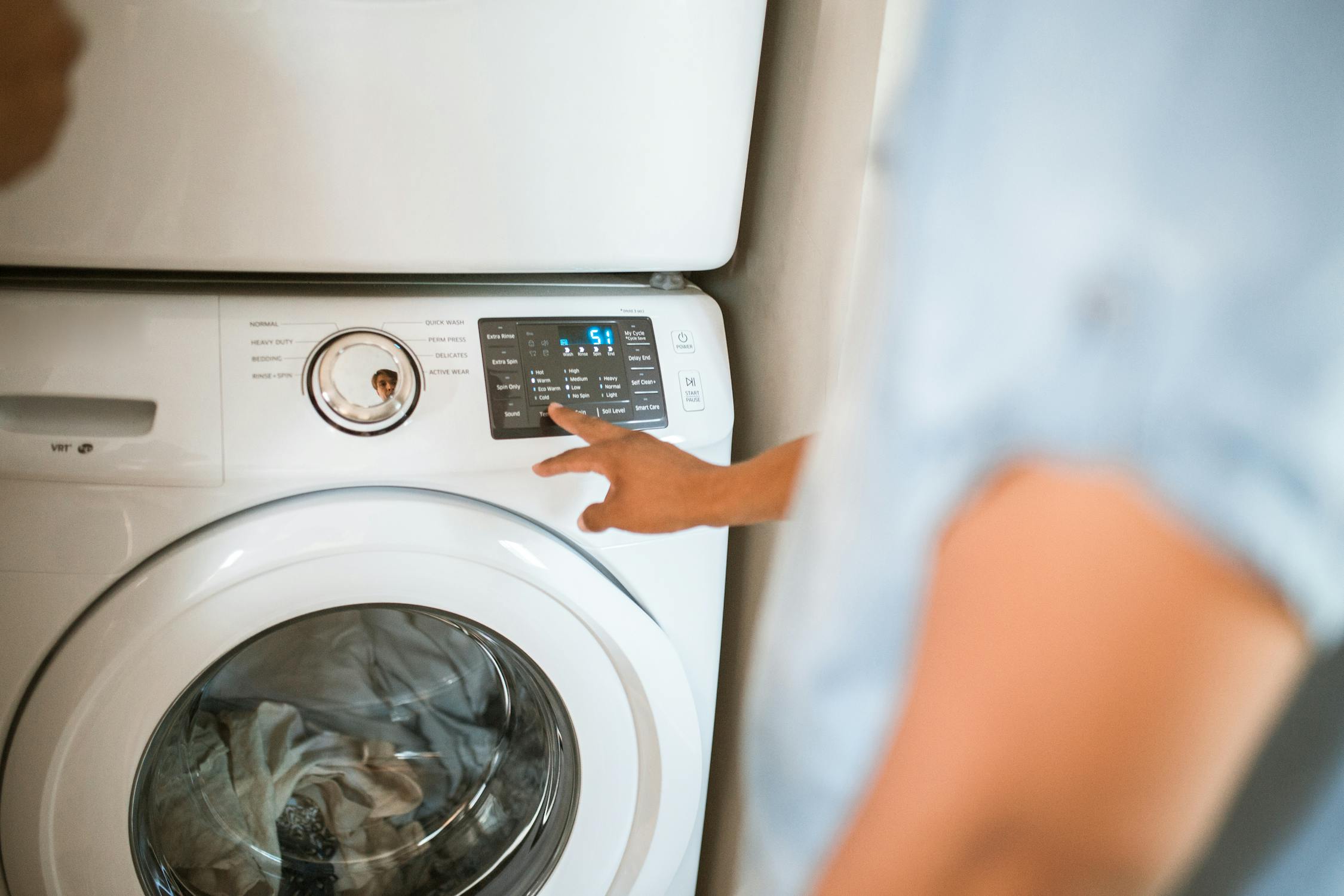
Communication Interfaces for Smart Washing Machines
Smart washing machines can utilize various communication interfaces to connect and interact with other devices or networks. Here are some commonly used communication interfaces for smart washing machines:
- Wi-Fi
- Bluetooth
- Zigbee
- Z-Wave
- LoRa
- Cellular LTE
How to Select a Suitable Communication Interface?
The following key considerations help to choose the best communication interfaces for smart washing machines.
- They are mostly placed in indoor faculty, having already deployed suitable infrastructure.
- Multiple-floor building requires strong connectivity within the whole smart home premises.
- Smart washing machines have several sensors placed in multiple locations inside.
Considering the above facts, the recommended communication interfaces are:
- Bluetooth for communication of sensors to IoT gateway. It enables quick and easy setup, control, and monitoring without an internet connection. You can want to know Bluetooth mesh in building automation application and BLE mesh gateways.
- Wi-Fi connectivity is highly suitable for individual users in homes. It provides a reliable and widespread internet connection, allowing users to control and monitor their smart washing machines anywhere within their home network. Wi-Fi connectivity allows for integration with other smart devices in the home, providing a seamless and interconnected smart home experience. Explore Bluetooth WiFi gateway to bridge your BLE-enabled washing machine data to the cloud.
SoC Technology in the smart washing machine
System-on-Chip (SoC) technology is crucial in developing smart washing machines. Some key aspects of SoC technology in smart washing machines:
Connectivity: SoCs provide built-in connectivity options that enable features like remote control, smartphone app, and smart home integration, where users can monitor and control their washing machines from anywhere.
Sensor Integration: Smart washing machines utilize various sensors, such as load sensors, water level sensors, temperature sensors, and motion sensors, to optimize the washing process. SoCs facilitate the integration and management of these sensors, allowing the washing machine to collect data and adjust settings automatically based on the detected conditions.
User Interface: SoCs power the user interface of smart washing machines, enabling intuitive control panels with touchscreens, LED displays, and other interactive elements. The processing capabilities of SoCs ensure smooth and responsive user interactions, making it easier for users to select washing programs, monitor progress, and access advanced features.
Dusun’s IoT Edge Computing Gateway products align with these benefits. It empowers manufacturers to leverage SoC technology and develop advanced smart washing machines with seamless connectivity, optimized performance, and improved user experiences.
Dusun application for smart washing machine
The DSGW-210 IoT Edge Computing Gateway can be suitable for integrating smart washing machines into an IoT ecosystem for the following reasons.
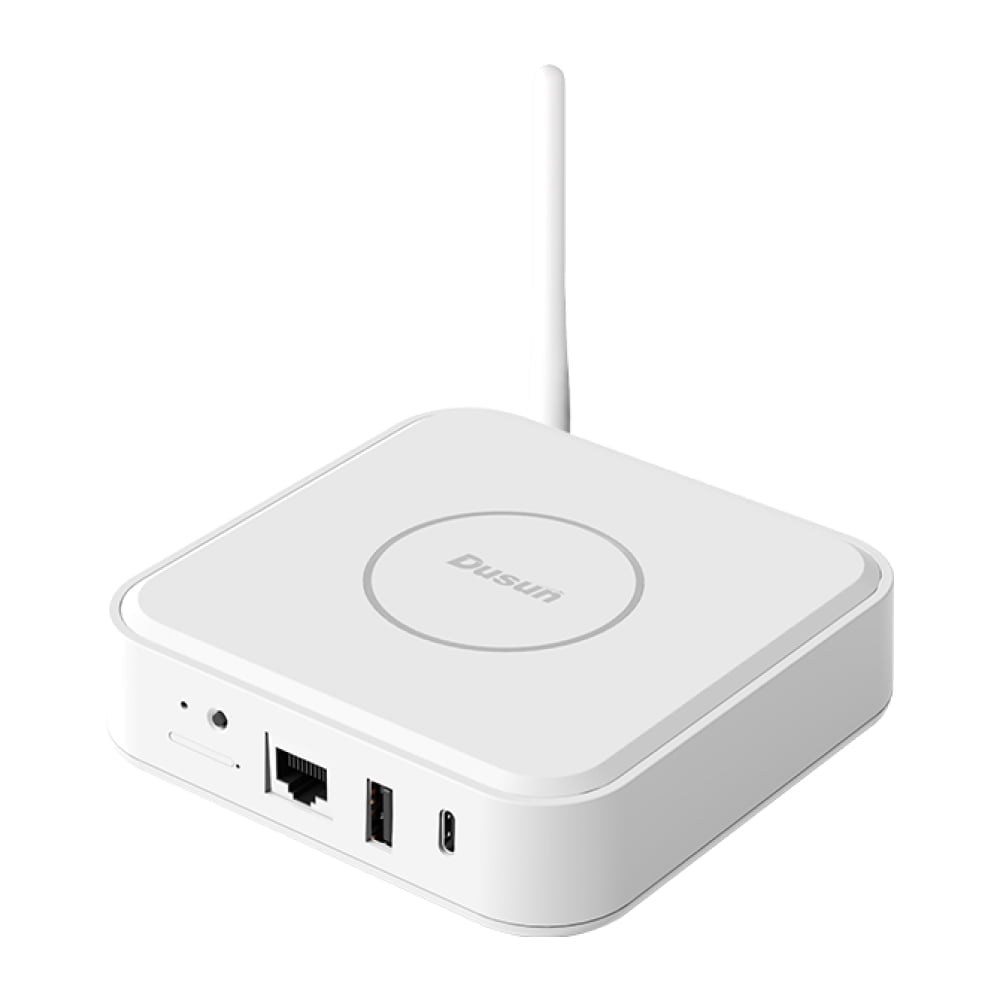
Connectivity Options: The Dusun DSGW-210 IoT bridge gateway supports a wide range of wireless protocols, including Wi-Fi, Bluetooth, Zigbee, and Z-Wave. These connectivity options allow seamless communication between the smart washing machine and other devices or platforms in the IoT network.
Edge Computing Capabilities: The DSGW-210 has a Quad-core Cortex A53 CPU and runs on Linux Debian 9, providing sufficient processing power and flexibility for edge computing tasks. The gateway can perform local data processing, analytics, and decision-making tasks, reducing latency and improving overall system performance.
Wireless Sensor Integration: Smart washing machines can benefit from the DSGW-210’s support for wireless sensors. For example, Zigbee can connect and control smart laundry sensors, while Z-Wave can integrate with water leak detection or door/window sensors for added security.
Data Security: With hardware encryption using ECC608 and support for secure communication protocols, the DSGW-210e Enocean gateway ensures that data transmitted between the washing machine and the IoT network remains safe and protected from unauthorized access.
Cloud Integration: The DSGW-210 can seamlessly integrate with popular cloud platforms like AWS IoT Core and Azure IoT, enabling real-time data streaming, remote monitoring, and management of the smart washing machine.
Smart Washing Machine FAQs
How to integrate IoT Gateway to transform an ordinary washing into a smart one?
To integrate an IoT gateway and make a washing machine smart, connect the washing machine to the selected gateway device via compatible communication protocols such as Wi-Fi, Bluetooth, Zigbee, or Z-Wave. Set up data collection, transmission, and processing capabilities to enable remote control, monitoring, and analysis of relevant metrics. Finally, test the integration to ensure proper functionality and a seamless smart washing machine experience.
What challenges can a manufacturer face while motivating consumers for a smart washing machine?
Major challenges are motivating consumers to adopt smart washing machines due to higher costs, limited awareness, concerns about compatibility, privacy and security, complexity, resistance to change, and connectivity issues.






